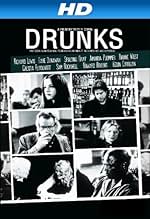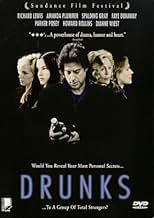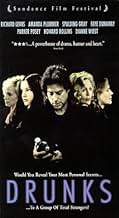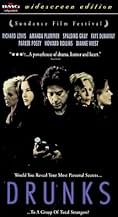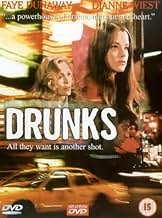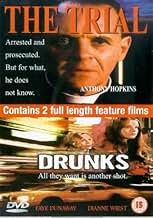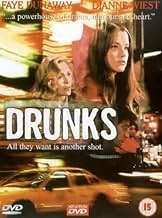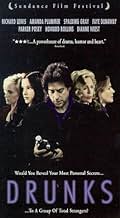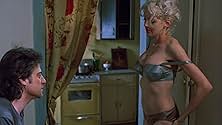AVALIAÇÃO DA IMDb
6,4/10
1,3 mil
SUA AVALIAÇÃO
Adicionar um enredo no seu idiomaThe lives of Jim and other alcoholics in and outside an AA meeting.The lives of Jim and other alcoholics in and outside an AA meeting.The lives of Jim and other alcoholics in and outside an AA meeting.
- Prêmios
- 1 vitória no total
Howard E. Rollins Jr.
- Joseph
- (as Howard Rollins)
Avaliações em destaque
they say in the program "one day at a time". some days are harder than others. DRUNKs represents that better than any film i have ever seen. I am the member of a twelve step program. I think it is one of the greatest international communities that exists. it has changed countless lives and i am hard pressed to think or find one person who's life hasn't been affected positively by it's existence. it is a secular religion -if you will.
I believe this is the most realistic and resonant film that has ever taken as it's focus the program and it's demographic busting community.
i think the level of talent that came together to make this is a testament to it's quality.
it is not a rose colored take on the community. it reflects as does the program the myriad ways that people use, don't use, succeed and fail.
it is the truth as i experience it.
I believe this is the most realistic and resonant film that has ever taken as it's focus the program and it's demographic busting community.
i think the level of talent that came together to make this is a testament to it's quality.
it is not a rose colored take on the community. it reflects as does the program the myriad ways that people use, don't use, succeed and fail.
it is the truth as i experience it.
Richard Lewis is one of my all-time favorite comedians. Mel Brooks once called him the Franz Kafka of comedy, and it's not far from the truth. The guy crafts such agonizing and harrowing comedy out of neuroses and problems and just common familial and relationship and whatever dread that it's staggering to watch (seeing him recently it was even more free-form and stream-of-conscious than ever, like Kurt Vonnegut and Woody Allen in a Bowery bar telling penis jokes). But he also was, in his past, troubled and on drugs and alcohol and went to a therapist for years and so on, and finally kicked it for good in the early 90s (he even wrote a sprawling, scatter-shot tell-all book called The Other Great Depression). So, in 1995, he took the lead part in Drunks, and if it may seem like his performance as Jim is so spot on and incredible it's more than likely because he knows this character, maybe all too well.
I go on about Lewis so much just because he's the character most on the edge, the one falling off amongst all these other AA people meeting in a Manhattan Church, that it's impossible to take your eyes off him when he shows up. Jim, who speaks very reluctantly to the couple of dozen people at the AA meeting, lost his wife to a brain aneurysm two years after becoming sober from booze and junk. Then he slipped and went back and at the time of the meeting he hasn't had a drink in several months. Right after this long and heartfelt confession he leaves and wanders the streets, tempted at first and finally giving in to his insatiable craving to whiskey and beer. While he goes from either bar to his apartment or on the streets for drugs the film cuts back to the AA meeting where other people share their experiences, some fatally tragic like the blackout guy, or Dianne Wiest's doctor, or Faye Dunaway's upper-class mother, or Sam Rockwell's seemingly regular guy, or even Parker Posey as an ex-hippie chick.
Hell, even Calista Flockheart gives a showstopper of a performance, which is an indicator of how on top of things the actors are here. It is, if as a real liability, written and performed like a play, and it's broken up as a series of monologues inter-cut with Jim in his downward spiral mode. The good thing about director Peter Cohn's approach is that even if a monologue falls kind of flat- I actually didn't care much for Spalding Gray who sort of mumbled through his character's turn as the guy who just showed up not knowing it was an AA meeting in the basement of the church- it can cut back to Richard Lewis who, in particular in one later scene at a bar, lays it down to such a heartbreaking beat that you almost wish he was in a Bergman movie or something - or, for that matter, one of Woody Allen's serious films. He's that amazing here, whether it's just how he is or if it's a "performance" or whatever. It's an actor's movie, and for that it works well. Just don't watch it for anything fancy or flashy; it's slightly obscure for that reason, since it doesn't have a real "star" attached.
I go on about Lewis so much just because he's the character most on the edge, the one falling off amongst all these other AA people meeting in a Manhattan Church, that it's impossible to take your eyes off him when he shows up. Jim, who speaks very reluctantly to the couple of dozen people at the AA meeting, lost his wife to a brain aneurysm two years after becoming sober from booze and junk. Then he slipped and went back and at the time of the meeting he hasn't had a drink in several months. Right after this long and heartfelt confession he leaves and wanders the streets, tempted at first and finally giving in to his insatiable craving to whiskey and beer. While he goes from either bar to his apartment or on the streets for drugs the film cuts back to the AA meeting where other people share their experiences, some fatally tragic like the blackout guy, or Dianne Wiest's doctor, or Faye Dunaway's upper-class mother, or Sam Rockwell's seemingly regular guy, or even Parker Posey as an ex-hippie chick.
Hell, even Calista Flockheart gives a showstopper of a performance, which is an indicator of how on top of things the actors are here. It is, if as a real liability, written and performed like a play, and it's broken up as a series of monologues inter-cut with Jim in his downward spiral mode. The good thing about director Peter Cohn's approach is that even if a monologue falls kind of flat- I actually didn't care much for Spalding Gray who sort of mumbled through his character's turn as the guy who just showed up not knowing it was an AA meeting in the basement of the church- it can cut back to Richard Lewis who, in particular in one later scene at a bar, lays it down to such a heartbreaking beat that you almost wish he was in a Bergman movie or something - or, for that matter, one of Woody Allen's serious films. He's that amazing here, whether it's just how he is or if it's a "performance" or whatever. It's an actor's movie, and for that it works well. Just don't watch it for anything fancy or flashy; it's slightly obscure for that reason, since it doesn't have a real "star" attached.
Maybe the best movie about substance abuse I've ever seen...and I've seen most of them.
Gritty, realistic, darkly humorous, and deadly serious.
Richard Lewis at his best. Excellent supporting cast.
Watch it two or three times to catch all the subtleties of the various subplots.
This movie is an absolute must-see for anybody in recovery from alcoholism or drug addiction. This goes double for those recovering from both.
Also good for friends and loved ones of people in recovery.
Gritty, realistic, darkly humorous, and deadly serious.
Richard Lewis at his best. Excellent supporting cast.
Watch it two or three times to catch all the subtleties of the various subplots.
This movie is an absolute must-see for anybody in recovery from alcoholism or drug addiction. This goes double for those recovering from both.
Also good for friends and loved ones of people in recovery.
"Drunks" is a satisfying glimpse into an AA meeting. The setting is realistic; it takes place in what appears to be a basement room of a church - there is coffee, cigarette smoking, and people who are on the edge. The movie's strength resides in its incredibly gifted cast: Diane Wiest (a particularly superb, understated performance to which we've become accustomed), Harold Robbins, Jr.,(you can feel his tension), Spaulding Grey (the ultimate humorist), Amanda Plummer (fantastic), Sam Rockwell (who is, unfortunately, underutilized). Also giving nice turns are Calista Flockhart (not yet marked with the Ally McBeal imprint) and Faye Dunaway (whose rich, deep voice resonates as ever). And, of course, there's Richard Lewis, who effectively applies his ample, frenetic energy in a bold, dramatic direction as a recovering alcoholic who takes a nose-dive off the wagon. We watch as Lewis's partners from AA, worried about his sobriety, try in vain to contact him. Meanwile, the movie turns it focus to the other characters attending the meeting. Some may be of the opinion that this movie should have allowed the main characters more time to develop their personal stories. However, not all people who attend an AA meeting say that much - or actively participate at all. While this was disappointing in the sense that one is left wanting more screen time from such capable actors, the writer and director maintained the veracity of the subject matter. "Drunks" provides the viewer with a realistic depiction of addiction as a symptom of "inner demons." The characters whose lives we get to peek into share this manifestation of the pain they carry deep inside, but their monologues shows us that the reasons for their pain are unique. Unlike, "Days of Wine and Roses," where the plot revolves around how just two characters play off of each other, "Drunks" uses short vignettes - almost like headlines - to punctuate a multitude of perspectives on the same disease.
As others have stated "Drunks" is less a movie than a string of monologues. Since these monologues are presented by a group of very fine actors, "Drunks" is essential viewing for acting students.
The performances are uniformly strong, with stand outs from Faye Dunaway, Calista Flockhart and a particularly well drawn, understated turn by Dianne Wiest. A great pity that Kevin Corrigan and Sam Rockwell are around and given nothing much to do. Richard Lewis has the central role, and to his credit, puts in a convincing performance.
The other, far larger group for whom this movie has great relevance is that of the addictive personality. Although the movie is dealing with alcoholism, it could quite easily be substituted by a host of substances or activities which in effect take over and often ruin lives. "Drunks" very much brings home the suffering that addiction causes, while stressing the suffering which led to the addiction itself.
An unsatisfying film, whose parts in themselves, make it worthy.
The performances are uniformly strong, with stand outs from Faye Dunaway, Calista Flockhart and a particularly well drawn, understated turn by Dianne Wiest. A great pity that Kevin Corrigan and Sam Rockwell are around and given nothing much to do. Richard Lewis has the central role, and to his credit, puts in a convincing performance.
The other, far larger group for whom this movie has great relevance is that of the addictive personality. Although the movie is dealing with alcoholism, it could quite easily be substituted by a host of substances or activities which in effect take over and often ruin lives. "Drunks" very much brings home the suffering that addiction causes, while stressing the suffering which led to the addiction itself.
An unsatisfying film, whose parts in themselves, make it worthy.
Você sabia?
- CuriosidadesScript began as a play, "Blackout", which ran Off-Broadway in 1990.
- Citações
Debbie: You want to talk about bad blackouts? I was married in one. I was married in a blackout, I'm serious. I was 19 years old. I was married for 6 weeks, yeah. I was married to this guy named Wild Bob. That was his full name, Wild Bob. So I guess I was Mrs. Wild Bob. Hi everyone, welcome to my life. Do you Debbie, take Wild Bob to be your lawfully wedded husband? I do.
- ConexõesReferenced in Dinner for Five: Episode #2.2 (2003)
Principais escolhas
Faça login para avaliar e ver a lista de recomendações personalizadas
- How long is Drunks?Fornecido pela Alexa
Detalhes
Bilheteria
- Faturamento bruto nos EUA e Canadá
- US$ 38.268
- Fim de semana de estreia nos EUA e Canadá
- US$ 17.581
- 16 de mar. de 1997
- Faturamento bruto mundial
- US$ 38.268
- Tempo de duração
- 1 h 30 min(90 min)
- Mixagem de som
- Proporção
- 1.85 : 1
Contribua para esta página
Sugerir uma alteração ou adicionar conteúdo ausente


